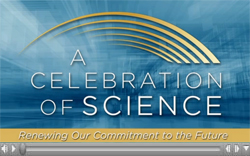 Most of us—whether we’re making discoveries or funding them—spend our time focused on driving science forward. Occasionally we have the opportunity to revel in the advances that have been made and see firsthand how they change lives. That’s what happened here at NIH a few weekends ago, and it was an absolute delight.
Most of us—whether we’re making discoveries or funding them—spend our time focused on driving science forward. Occasionally we have the opportunity to revel in the advances that have been made and see firsthand how they change lives. That’s what happened here at NIH a few weekends ago, and it was an absolute delight.
FasterCures and the Milken Institute organized A Celebration of Science, a 3-day event in the Washington, D.C., area to reaffirm the importance of biomedical research. It brought together more than 1,000 scientists, patients, policymakers, businesspeople, artists and others who have made discoveries in, have been affected by or simply wanted to know more about biomedical research. The group came to NIH on a Saturday to hear about cutting-edge research, people whose lives have changed for the better because of biomedical advances, and the economic impacts of NIH investments.
Research funded by NIGMS was featured in a presentation by Susan Lindquist of the Whitehead Institute for Biomedical Research, who talked about her work related to protein folding and misfolding. Although introducing these concepts to a mostly nonscientific audience was no easy task, she had the audience roaring with laughter when she showed protein folding in a test tube as a few synchronized swimmers in an Olympic-sized pool and then protein folding in a real cell interior as a crowded wave pool in Tokyo . . . on a VERY hot day. Her presentation also highlighted two features common among NIGMS’ basic research portfolios:
- Using model organisms (in her case, yeast) to make discoveries about quite complex human diseases, and
- Finding that the same fundamental cellular processes work (or don’t work) in diseases we think of as very different (e.g., Alzheimer’s disease and cancer).
These are just a few highlights of the exciting and inspiring day at NIH. For more, watch this 10-minute overview or the entire NIH morning session and afternoon session.

